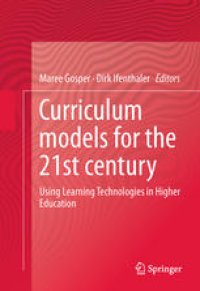
Ebook: Curriculum Models for the 21st Century: Using Learning Technologies in Higher Education
- Tags: Curriculum Studies, Pedagogic Psychology, Educational Technology, Learning & Instruction
- Year: 2014
- Publisher: Springer-Verlag New York
- Edition: 1
- Language: English
- pdf
Changing student profiles and the increasing availability of mainstream and specialized learning technologies are stretching the traditional face-to-face models of teaching and learning in higher education. Institutions, too, are facing far-reaching systemic changes which are placing strains on existing resources and physical infrastructure and calling into question traditional ways of teaching through lectures and tutorials. And, with an ever-increasing scrutiny on teaching and teachers’ accountability for positive educational outcomes, the call for closer attention to learning, teaching and, most especially, to the design and delivery of the curriculum is given increasing relevance and importance.
Research provides strong evidence of the potential for technologies to facilitate not only cognition and learning but also to become integral components in the redesign of current curriculum models. Some Universities and individual academics have moved along this pathway, developing new and innovative curriculum, blending pedagogies and technologies to suit their circumstances. Yet, there are others, unsure of the possibilities, the opportunities and constraints in these changing times. Curriculum Models for the 21st Century gives insights into how teaching and learning can be done differently. The focus is on a whole of curriculum approach, looking at theoretical models and examples of practice which capitalize on the potential of technologies to deliver variations and alternatives to the more traditional lecture-based model of University teaching.
Changing student profiles and the increasing availability of mainstream and specialized learning technologies are stretching the traditional face-to-face models of teaching and learning in higher education. Institutions, too, are facing far-reaching systemic changes which are placing strains on existing resources and physical infrastructure and calling into question traditional ways of teaching through lectures and tutorials. And, with an ever-increasing scrutiny on teaching and teachers’ accountability for positive educational outcomes, the call for closer attention to learning, teaching and, most especially, to the design and delivery of the curriculum is given increasing relevance and importance.
Research provides strong evidence of the potential for technologies to facilitate not only cognition and learning but also to become integral components in the redesign of current curriculum models. Some Universities and individual academics have moved along this pathway, developing new and innovative curriculum, blending pedagogies and technologies to suit their circumstances. Yet, there are others, unsure of the possibilities, the opportunities and constraints in these changing times. Curriculum Models for the 21st Century gives insights into how teaching and learning can be done differently. The focus is on a whole of curriculum approach, looking at theoretical models and examples of practice which capitalize on the potential of technologies to deliver variations and alternatives to the more traditional lecture-based model of University teaching.
Changing student profiles and the increasing availability of mainstream and specialized learning technologies are stretching the traditional face-to-face models of teaching and learning in higher education. Institutions, too, are facing far-reaching systemic changes which are placing strains on existing resources and physical infrastructure and calling into question traditional ways of teaching through lectures and tutorials. And, with an ever-increasing scrutiny on teaching and teachers’ accountability for positive educational outcomes, the call for closer attention to learning, teaching and, most especially, to the design and delivery of the curriculum is given increasing relevance and importance.
Research provides strong evidence of the potential for technologies to facilitate not only cognition and learning but also to become integral components in the redesign of current curriculum models. Some Universities and individual academics have moved along this pathway, developing new and innovative curriculum, blending pedagogies and technologies to suit their circumstances. Yet, there are others, unsure of the possibilities, the opportunities and constraints in these changing times. Curriculum Models for the 21st Century gives insights into how teaching and learning can be done differently. The focus is on a whole of curriculum approach, looking at theoretical models and examples of practice which capitalize on the potential of technologies to deliver variations and alternatives to the more traditional lecture-based model of University teaching.
Content:
Front Matter....Pages i-xxvi
Front Matter....Pages 15-15
Breaking Away from Text, Time and Place....Pages 17-33
The Social Processes of Web 2.0 Collaboration: Towards a New Model for Virtual Learning....Pages 35-53
Open Educational Curricula Interpreted Through the Māori Concept of Ako....Pages 55-70
Front Matter....Pages 71-71
Research-Based Learning: Connecting Research and Instruction....Pages 73-89
Personalized Engineering Education for the Twenty-First Century....Pages 91-111
Creating Curriculum Within the Context of an Enterprise....Pages 113-134
Interteaching: A Model to Enhance Student Engagement....Pages 135-153
Digital Wet Laboratories: Transforming Biological Science with Engaging Blended Learning and Online Support....Pages 155-179
A Curriculum Model to Promote (Chiropractic) Clinical Thinking with Video-Case Annotation....Pages 181-210
Front Matter....Pages 211-211
Connecting Student Learning at University with Professional Practice Using Rich Media in Practice-Based Curricula....Pages 213-233
Round-Tripping RSS for Socialized Techno-Pedagogy in a Twenty-First-Century Learning Community....Pages 235-257
Recasting Lecture Material Using Podcasts: An Educational Psychology Case Study....Pages 259-277
Digital Games as Tools for Designing and Implementing Pedagogical Innovations: A Review of Literature....Pages 279-293
Problem Solving Through Video Game Creation....Pages 295-311
Immersive Simulation: The Replication of Environments to Practice Problem Solving....Pages 313-324
Virtual Worlds in Higher Education: The Challenges, Expectations and Delivery....Pages 325-349
Trialing e-Portfolios for University Learning: The Devil in the Detail....Pages 351-367
Front Matter....Pages 369-369
University Student Experiences of Inquiry and Technologies....Pages 371-388
Innovators and Institutions Working as Partners on Sustainable Change....Pages 389-406
Curriculum Design for the Twenty-First Century....Pages 1-14
Front Matter....Pages 369-369
Managing the Challenges of Technology to Support Learning: Some Lessons from Experience....Pages 407-422
Sustainable Practice in Embedding Learning Technologies: Curriculum Renewal Through Course Design Intensives....Pages 423-442
Back Matter....Pages 443-444